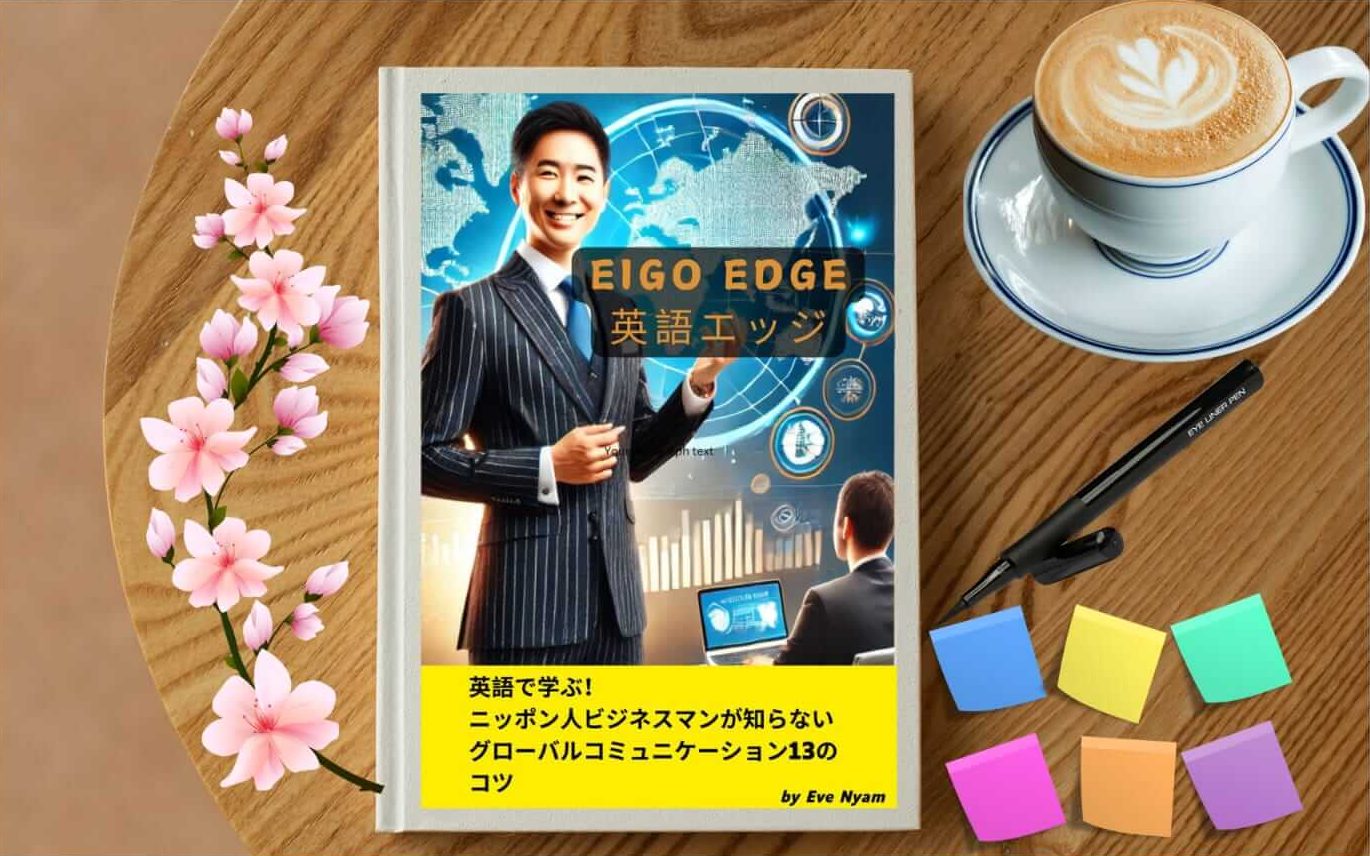Hey there! If you’re a Japanese businessman trying to squeeze in some Business English study between meetings, emails, and maybe the occasional konbini run—you’re not alone.
Back when I was teaching at an English conversation school here in Japan, I met tons of professionals just like you—smart, motivated, but super busy. That’s actually what inspired me to start Eigo Edge. I wanted to create something fun, practical, and totally designed for your crazy schedule.
So, what’s the best way to study Business English when time is tight? Should you stick with a conversation school, or is a well-written Business English book the smarter choice? In this post, I’ll break it all down so you can find the study method that fits you best.
Let’s begin by understanding that in today’s globalized business world, English proficiency is no longer optional for Japanese businessmen and women —it’s a necessity. Whether you’re negotiating deals, presenting to international clients, or handling emails with overseas colleagues, mastering Business English can significantly boost your career prospects. However, with demanding work schedules and limited free time, many Japanese business professionals struggle to find the most effective and convenient way to study English.
Two of the most popular learning methods are English conversation schools (英会話スクール) and business English books (ビジネス英語本).
Each method offers unique benefits and drawbacks, making it crucial to choose the right one based on your personal learning style, schedule, and professional needs.
English conversation schools provide structured lessons with native speakers, offering real-time practice and immediate feedback. But they can be expensive and require a fixed commitment, which might not be ideal for a busy professional. On the other hand, business English books allow for self-paced learning at a lower cost, but they lack interactive speaking practice and real-world application.
So, which method is the best for busy Japanese professionals?
In this article, we’ll compare the pros and cons of both approaches, provide practical recommendations, and help you create an effective study plan to improve your Business English efficiently.
Let’s jump in and get you speaking confident, natural Business English—without the stress!
What Do Japanese Business Professionals Need in Business English?

In Japan, there is a famous saying: 「備えあれば憂いなし」—“If you are prepared, you don’t have to worry.” This is especially true when it comes to learning Business English.
Preparation and strategy are key to success in the global business environment. Before deciding on a learning method, it’s essential to understand what specific skills Japanese professionals need in Business English.
Key Business English Skills for Japanese Professionals
- Business Meetings (ビジネス会議英語) – Understanding and participating in discussions, giving clear opinions, and responding to questions effectively.
- Email Writing (ビジネス英語メール) – Writing professional emails that are polite yet direct, avoiding common Japanese-English translation mistakes.
- Presentations (英語プレゼンテーション) – Delivering structured and confident presentations to international clients and colleagues.
- Negotiations (英語での交渉) – Learning key negotiation phrases, handling objections, and reaching agreements in English.
- Small Talk & Networking (英語でのスモールトーク) – Building rapport with foreign clients and partners, overcoming cultural communication barriers.
Many Japanese professionals face challenges in these areas due to cultural and linguistic differences. For example, direct communication in English can feel uncomfortable compared to the indirect style of Japanese business culture.
This is where targeted learning methods, whether through conversation schools or books, can make a difference.
But which method will best prepare you for success? In the next section, we’ll explore the advantages and disadvantages of English conversation schools and business English books, helping you choose the best fit for your learning style and professional goals.
English Conversation Schools
There’s an old Japanese saying: 習うより慣れろ- If you want to speak English fast, the best way is to speak as much as possible—which is exactly what English conversation schools (英会話スクール) offer.
Pros
✅ Real-world practice (実践的な英会話練習) – Instead of just memorizing phrases from a book, you’ll talk through real business situations, like negotiating contracts, handling Q&A sessions, or making small talk at networking events.
✅ Instant feedback (ネイティブ講師からの即時フィードバック) – Imagine this: You confidently say, “Let’s discussion about the project,” and your teacher immediately corrects you—“It’s ‘Let’s discuss the project.’” Boom! Instant improvement.
✅ Confidence boost (英語を話す自信がつく) – The more you practice, the less nervous you’ll feel about speaking English. Pretty soon, you’ll be handling meetings and presentations like a pro.
Cons
❌ Expensive (高額なレッスン料) – Let’s be real—good schools aren’t cheap. A single lesson can cost as much as a fancy dinner, and a full course? That’s a big investment.
❌ Time-consuming (忙しい社会人には不向き) – Between overtime work, social obligations, and personal time, who has time to commute to a school every week? Online lessons help, but you still need to commit to a fixed schedule.
❌ Quality varies (スクールによって質が異なる) – Not all schools (or teachers) are created equal. Some are amazing, some… not so much. Finding the right school can be hit or miss.
So, is an English conversation school worth it? If you need to speak English quickly, have the budget, and can commit to regular lessons, it’s a fantastic option. But if money and time are tight, you might need an alternative… like business English books. Let’s see how they compare!
Business English Books
There’s a saying in Japan: 「千里の道も一歩から」—“A journey of a thousand miles begins with a single step.” If you prefer learning at your own pace, business English books (ビジネス英語本) are an excellent option.
Pros
📖 Affordable (コスパの良い学習法) – A solid business English book costs less than one private lesson at an English school. Great value, right?
📖 Flexible learning schedule (自由な学習スケジュール) – Study whenever and wherever you want—on the train, during lunch breaks, or even in bed!
📖 Good for self-paced learners (自分のペースで学べる) – If you like structure and enjoy learning independently, books provide a great way to build knowledge systematically.
Cons
❌ No speaking practice (スピーキング練習ができない) – Books can’t talk back (yet!). So, while you’ll learn useful phrases, you won’t get actual speaking experience.
❌ No feedback on pronunciation (発音のフィードバックなし) – You might think you’re saying a word correctly… until you try it in real conversation and get confused looks.
❌ Can be hard to stay motivated (モチベーションの維持が難しい) – Let’s be honest, reading about business phrases isn’t as exciting as actually using them. Without interaction, it’s easy to lose interest.
So, are business English books worth it? If you’re disciplined, prefer self-study, and need a budget-friendly option, books can be a fantastic way to build knowledge. But for real-world speaking skills? You might need to mix in other study methods!
4. Comparison: Which One Is Better?
Feature | English Conversation Schools/ Eikaiwa sukūru | Business English Books |
Speaking Practice | ✅ Yes | ❌ No |
Cost | ❌ High | ✅ Low |
Flexibility | ❌ Fixed schedule | ✅ Anytime |
Feedback | ✅ Immediate | ❌ None |
Self-Study | ❌ Requires attendance | ✅ 100% self-paced |
The Best Strategy: A Hybrid Approach

There’s a famous saying: 「柔よく剛を制す」—“Softness overcomes hardness.”
A smart approach blends both methods to maximize results.
The secret sauce to mastering Business English? A delightful blend of conversation schools and business English books!
Think of it like making the perfect smoothie: you need that creamy yogurt (conversation practice) and fresh fruit (solid grammar and vocabulary) to create something truly delicious.
By combining the interactive, real-world skills from conversation schools with the structured knowledge from business English books, you’ll maximize your results and sound like a pro in no time.
So grab your metaphorical blender, mix it up, and get ready to impress in your next meeting—your future self will be doing the happy dance!
How to Combine Both for Maximum Results
📝 Use a book to build vocabulary and grammar (ビジネス英語の語彙と文法を強化) – Learn key phrases, global business etiquette and sentence structures first.
🗣 Attend lessons at least once a week for practice (週1回の英会話レッスンでアウトプット) – Reinforce what you learn by using it in real conversations.
🎧 Supplement with podcasts, YouTube, and shadowing (ポッドキャストやYouTubeでリスニング強化) – Expose yourself to natural Business English daily.
By combining structured learning with real-world practice, you’ll develop strong skills without burning out!
Recommended Resources
Top 3 English Conversation Schools in Japan
🏫 DMM Eikaiwa (DMM英会話) – Affordable and flexible online lessons with native and non-native teachers.
🏫 GABA (ガバマンツーマン英会話) – Personalized, one-on-one business English lessons with flexible scheduling.
🏫 Berlitz (ベルリッツ・ジャパン) – A trusted name in business English, with structured lessons focused on real-world corporate scenarios.
Top Business English Book for Japanese Professionals
📖 Eigo Edge: 英語で学ぶ! ニッポン人ビジネスマンが知らない グローバルコミュニケーション13のコツ– A practical guide focused on meetings, negotiations, and presentations for Japanese learners. Want to boost your career —master business English, ace interviews, and stand out in the global job market today!? Click here to start leveling up with Eigo Edge today!
PS: Now, before you ask, no, I won’t be publishing any competitor’s books here! Instead, let’s focus on the tips and tricks that will truly help you shine in your Business English journey!
Top 3 Free Online Tools for Business English Practice
🌍 BBC Learning English – Business English – Free lessons and videos designed for professionals.
🎙 Voice of America (VOA) Learning English – Great for listening practice with real-world business news.
📱 Quizlet (クイズレット) – Flashcards and quizzes to boost your vocabulary on the go.
With these powerful resources, mastering Business English is just a matter of time. Start today and watch your skills—and career—skyrocket!
Conclusion
If you’ve been pouring time and energy into conversation schools without seeing results, it might be time to shake things up!
Remember, learning Business English doesn’t have to be as daunting as a three-hour meeting with no coffee. With the right tools, you can turn your English skills from “uh-oh” to “oh yeah!”
So, don’t settle for mediocre when you can be fantastic! Embrace your unique journey, and let’s tackle business English learning with confidence. Your future self (and your next boss) will thank you for it!
Quick Recap: The Pros and Cons
💬 English Conversation Schools
- ✅ Real-world practice, instant feedback, confidence boost
- ❌ Expensive, time-consuming, quality varies
📚 Business English Books
- ✅ Affordable, flexible, great for self-paced learners
- ❌ No speaking practice, no feedback, hard to stay motivated
So, which one should you choose? The answer depends on your goals, budget, and learning style. If you need to improve fluency quickly, an English conversation school might be the best option—if you can afford the time and cost.
If you prefer to study at your own pace, a great book like ours will provide structured learning without the pressure.
Put in mind the fact that learning Business English is vital for your business life. It opens doors to new opportunities, helps you communicate effectively with international clients, and is essential for acing job interviews and excelling in meetings and presentations.
If you’d like to learn more about preparing for English job interviews—like mastering common questions and boosting your confidence—check out our resources for practical tips and insights here!
Final Recommendation: A Mix of Both!

It’s clear as day that, for busy professionals, the best approach is a hybrid strategy—combine the structure of books with the real-world practice of conversation lessons.
Use a book to learn new phrases, attend lessons to use them in conversation, and supplement with podcasts, videos, and shadowing to strengthen your listening and pronunciation.
By taking advantage of both structured learning and interactive practice, you’ll not only save time and money but also see real improvements in your Business English skills.
Don’t forget, consistency is key! Embrace a smart blend of conversation schools and business English books that fits your lifestyle. By mixing both methods, you’ll soon be speaking English with confidence in any business situation!”
Ready to take your Business English to the next level? Get your copy of Eigo Edge today and start seeing real results! Available now on Amazon Japan. Get your copy Here
📩 Want exclusive Business English tips straight to your inbox? Sign up for our newsletter below and get free learning resources, special offers, and expert advice!
Arigato Gozaimasu


